Discovering Dalian’s High-Tech Zone
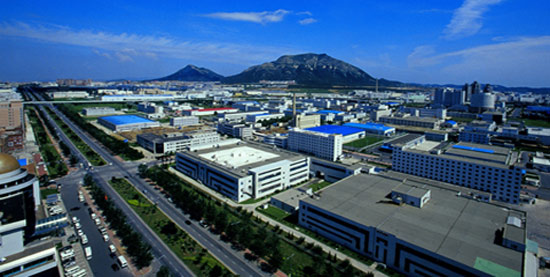
By Gary Clubb
DALIAN, Sept. 15 – Over a decade in the making, an ambitious series of high-tech development projects are now well underway in China’s northeastern port city of Dalian. Long a crucial player in both heavy and light industries, as well as distribution via shipping, Dalian is in the process of transforming itself into a back-office operations outsourcing center with lofty goals to compete not only with first tier business process outsourcing (BPO) hubs in China, such as Shanghai and Shenzhen, but also to compete globally with international BPO behemoths like Bangalore and Dublin.
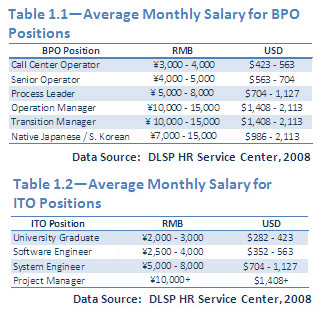 For historical reasons and also geographic ones, Dalian has developed a large population of fluent Japanese speakers, making the city an ideal location for Japanese firms, as well as western MNEs looking for a cost-effective solution for serving the Japanese market. In addition to strong Japanese language skills, many university students in Dalian are graduating with degrees in IT fields such as computer science and software engineering. The high concentration of technical universities in and around Dalian ensures a continuous stream of new talent to supplement the highly skilled human resources already available. Furthermore, the Dalian labor pool is seen as being highly cost-effective, with average wages at less than 70 percent of their Shanghai counterparts. In recent years a number of companies have also developed BPOs in Dalian servicing English-speaking countries, so there is a fast-growing pool of English speakers as well. Add to that the large ethnic Korean population in the region who can service the Korean BPO market and you can see that Dalian is becoming quite a hub for multilingual resources. In fact it is not unusual these days to find people working in the zone that speak Chinese, Japanese, English and Korean quite fluently.
For historical reasons and also geographic ones, Dalian has developed a large population of fluent Japanese speakers, making the city an ideal location for Japanese firms, as well as western MNEs looking for a cost-effective solution for serving the Japanese market. In addition to strong Japanese language skills, many university students in Dalian are graduating with degrees in IT fields such as computer science and software engineering. The high concentration of technical universities in and around Dalian ensures a continuous stream of new talent to supplement the highly skilled human resources already available. Furthermore, the Dalian labor pool is seen as being highly cost-effective, with average wages at less than 70 percent of their Shanghai counterparts. In recent years a number of companies have also developed BPOs in Dalian servicing English-speaking countries, so there is a fast-growing pool of English speakers as well. Add to that the large ethnic Korean population in the region who can service the Korean BPO market and you can see that Dalian is becoming quite a hub for multilingual resources. In fact it is not unusual these days to find people working in the zone that speak Chinese, Japanese, English and Korean quite fluently.
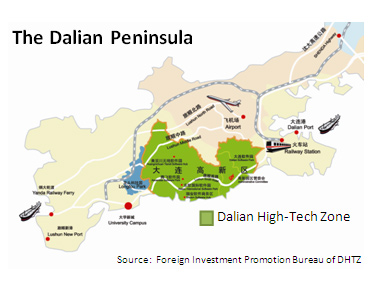 At the center of Dalian’s high tech and BPO aspirations is a 150 square kilometer special economic and investment zone located just southwest of the city proper, known as the Dalian High-Tech Zone (DHTZ). Upon completion, this zone will be composed of several sub-parks, each with a slightly different focus and its own unique characteristics. As the sub-parks are being developed in separate phases, some were finished several years ago and are already occupied at near capacity, whereas others are still in the initial stages of development. Comprising phase one of the software park are the Dalian Neusoft Park and the Dalian Software Park, which have been running for just over a decade. As the earliest sub-parks to be completed and put into operation, they are both occupied at near-capacity with Neusoft having recently expanded its operations by adding new facilities in 2008 and the Dalian Software Park planning to construct additional buildings in the very near future to meet new demand.
At the center of Dalian’s high tech and BPO aspirations is a 150 square kilometer special economic and investment zone located just southwest of the city proper, known as the Dalian High-Tech Zone (DHTZ). Upon completion, this zone will be composed of several sub-parks, each with a slightly different focus and its own unique characteristics. As the sub-parks are being developed in separate phases, some were finished several years ago and are already occupied at near capacity, whereas others are still in the initial stages of development. Comprising phase one of the software park are the Dalian Neusoft Park and the Dalian Software Park, which have been running for just over a decade. As the earliest sub-parks to be completed and put into operation, they are both occupied at near-capacity with Neusoft having recently expanded its operations by adding new facilities in 2008 and the Dalian Software Park planning to construct additional buildings in the very near future to meet new demand.
Neusoft, which was founded in 1988 by two professors of Northeast University (the acronym of which is present in the NEU of Neusoft), is an IT/software institute that combines research and training with services and engineering. As China’s largest offshore outsourcing provider, Neusoft ranked 50th on the 2009 Global Outsourcing 100 and has formed international partnerships with Cisco, HP, IBM, Intel, Microsoft, Nokia, Philips, Sony, and Symantec among others. Their Dalian sub-park, centrally located in the DHTZ, is the largest of Neusoft’s four corporate campuses, consisting of the Neusoft Software R&D Base, Neusoft Institute of Information and Technology, and the International Cooperation Industrial Area. These facilities provide 300,000 square meters of floor area for more than 15,000 students, engineers, and IT professionals. Neusoft does not offer any office space for other companies to establish their own in-house service centers; instead their model relies on utilizing their own employees to work on behalf of MNEs, primarily in the provision of BPO or ITO services.
To the northeast, the privately owned and operated Dalian Software Park (DLSP) should be of more interest to foreign companies looking to set up operations in the DHTZ. This park is owned by the Dalian-based Yida Group, the largest and most successful privately owned real estate development company in Northeast China, and managed through their subsidiary DLSP Co., Ltd. According to the latest facts and figures provided by Mr. Andy Xu, the DLSP Business Solutions Center Project Manager, of the park’s 450 companies 43 percent are foreign invested; 25 percent of which are Japanese firms. Furthermore, there are currently 37 Fortune Global 500 companies with buildings and office space in DLSP, including Accenture, Avaya, BT, Cisco, Convergys, Fidelity, Genpact, HP, HSBC, IBM, Oracle, and SAP. Three of these MNEs (Genpact, HP, and IBM) have an employee headcount of more than 3000, with HP operating a 1000-seat call center. The companies that establish themselves in the DLSP have access not only to skilled human resources and cost effective office space, but also various services such as build-operate-transfer (BOT), in which the financing, design, construction, and initial operations are handled by DLSP before turning over full control to the investing MNE. This option can result in the attainment of operating stability more quickly than with in-house efforts, and has already been chosen by 11 companies in DLSP, including IBM in 2002.
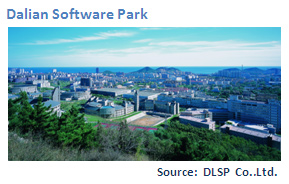 Without taking into account the additional facilities planned for the near future, DLSP covers 2.98 square kilometers of land area and offers 250,000 square meters of floor space. The offices are staffed by approximately 45,000 employees, including about 1000 foreign workers – 700 of which are Japanese. Aside from business offices, the sub-park also provides several restaurants, conveniences stores and coffee shops, as well as banks and two fitness centers. Since 1998, total revenues for the operations established in DLSP have grown from RMB200 million to over RMB30 billion in 2008. Due to the success of this initial software park and in order to meet future demand, a second phase is well underway that includes the Dalian Ascendas IT Park and the Dalian Tiandi Software Hub.
Without taking into account the additional facilities planned for the near future, DLSP covers 2.98 square kilometers of land area and offers 250,000 square meters of floor space. The offices are staffed by approximately 45,000 employees, including about 1000 foreign workers – 700 of which are Japanese. Aside from business offices, the sub-park also provides several restaurants, conveniences stores and coffee shops, as well as banks and two fitness centers. Since 1998, total revenues for the operations established in DLSP have grown from RMB200 million to over RMB30 billion in 2008. Due to the success of this initial software park and in order to meet future demand, a second phase is well underway that includes the Dalian Ascendas IT Park and the Dalian Tiandi Software Hub.
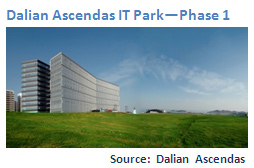 Construction at the centrally-located Dalian Ascendas IT Park began in 2006 atop a 350,000 square meter stretch of land overlooking Hekou Bay. This IT Park is a 50-50 joint venture between DLSP and Singapore-based Ascendas, a leading provider of business space solutions in Asia with key markets in Singapore, China, India, South Korea and the Philippines that will also be in charge of managing Dalian Ascendas. The project will be finished within the next five to eight years, by which time it will effectively be an integrated business park. In addition to office buildings, the project will include a commercial hub with an exciting mix of retail, entertainment, recreational/spa/F&B and convention spaces organized around a central event plaza. The first office building was completed in July of 2007 and has since been occupied by over 20 companies, including Toyota, NetApp, Konica Minolta, and DHC. Staffed by a total of over 3,000 employees, these companies’ operations range from BPO and software development to R&D and consulting. The second building at Dalian Ascendas is nearing completion with construction to finish in September of 2009, effectively doubling the current floor space to 200,000 square meters.
Construction at the centrally-located Dalian Ascendas IT Park began in 2006 atop a 350,000 square meter stretch of land overlooking Hekou Bay. This IT Park is a 50-50 joint venture between DLSP and Singapore-based Ascendas, a leading provider of business space solutions in Asia with key markets in Singapore, China, India, South Korea and the Philippines that will also be in charge of managing Dalian Ascendas. The project will be finished within the next five to eight years, by which time it will effectively be an integrated business park. In addition to office buildings, the project will include a commercial hub with an exciting mix of retail, entertainment, recreational/spa/F&B and convention spaces organized around a central event plaza. The first office building was completed in July of 2007 and has since been occupied by over 20 companies, including Toyota, NetApp, Konica Minolta, and DHC. Staffed by a total of over 3,000 employees, these companies’ operations range from BPO and software development to R&D and consulting. The second building at Dalian Ascendas is nearing completion with construction to finish in September of 2009, effectively doubling the current floor space to 200,000 square meters.
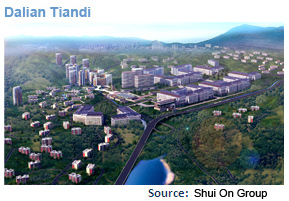 To the southwest of Ascendas is the site of what will become the newest and perhaps most ambitious addition to the DHTZ. Dalian Tiandi is a joint venture between Yida (30 percent) and the Hong Kong-based Shui On Group (70 percent), which is in charge of master planning, developing and managing the project. According to Han Zhi, the head of commercial operations, Dalian Tiandi is aiming to raise the bar and attract not only investment from large MNEs, but also retain highly skilled talent by creating a world-class, truly integrated, green neighborhood where one can work, live, learn and play. Dalian Tiandi, the name for the entire project development in Dalian, involves the construction of a four‐in‐one community utilizing 26.5 square kilometers of land area, with a floor area of 3.54 million square meters. It will provide facilities for a working and living population of over 300,000. Funded by approximately RMB30 billion, the construction of Dalian Tiandi will span 13 years and result in the following distinct but interconnected zones:
To the southwest of Ascendas is the site of what will become the newest and perhaps most ambitious addition to the DHTZ. Dalian Tiandi is a joint venture between Yida (30 percent) and the Hong Kong-based Shui On Group (70 percent), which is in charge of master planning, developing and managing the project. According to Han Zhi, the head of commercial operations, Dalian Tiandi is aiming to raise the bar and attract not only investment from large MNEs, but also retain highly skilled talent by creating a world-class, truly integrated, green neighborhood where one can work, live, learn and play. Dalian Tiandi, the name for the entire project development in Dalian, involves the construction of a four‐in‐one community utilizing 26.5 square kilometers of land area, with a floor area of 3.54 million square meters. It will provide facilities for a working and living population of over 300,000. Funded by approximately RMB30 billion, the construction of Dalian Tiandi will span 13 years and result in the following distinct but interconnected zones:
- Hekou Bay: This easternmost zone of Dalian Tiandi will boast sea-view residences, international schools, office buildings, and a five-star hotel, as well as leisure and entertainment in the form of luxury shopping, international cuisine, bars, and cafes. Of the total 1.2 million square meters of floor area, approximately 45 percent will be used for residential buildings, 35 percent for public structures, and 20 percent for office space. As of August 2009, sea reclamation has been completed for this project and the construction of the retail development is planned to commence in 2010 for synchronization with the development schedule of the new metro line. This line is designed to link Dalian to Hekou Bay as well connecting by transfer to a light rail which, upon projected completion in 2011, will service all four zones of Dalian Tiandi. With Shui On’s experience as a developer in creating lifestyle-oriented venues, the project is set to imbue the Hekou Bay community with the same fashionable flair as extremely popular Shanghai Xintiandi, one of Asia’s top-ranked mixed-use properties, which was also created by the Shui On Group.
- The Valley: Consisting primarily of office buildings for MNE headquarters, The Valley will be located further inland and to the west of Hekou Bay and also include centers for research and development. Construction will begin in future phases and result in a total of 245,000 square meter of floor area.
- Huang Ni Chuan: With a total floor area of nearly 1.8 million square meters, Huang Ni Chuan will be the largest of the four plates. Huang Ni Chuan and Hekou Bay are the first two plates to be developed as part of the Dalian Tiandi project. Site formation has already been carried out and construction of the first two blocks of office buildings is scheduled to be finished by the end of 2009, with the completion of engineering apartments to host 2000 engineers and a lifestyle retail center by Q3 2010. When complete, Huang Ni Chuan will consist of a software park, eco-friendly residences, IT training institutes, hotels, shopping centers, and other facilities for leisure and entertainment including a 7,000 square meter clubhouse. With 960,000 square meters devoted to office space making up more than 60 percent of the total office space in Dalian Tiandi, Huang Ni Chuan will serve as a focal point for investment and home for international ITO and BPO enterprises.
- Nan Hai Tou: Designed as an area for luxury resort living, Nan Hai Tou will be nestled along a coastal inlet against a green, mountainous backdrop; offering a seaside holiday resort featuring high-end residences and hotels to comprise the majority of the 256,000 square meters of floor space.
By providing a complete living environment instead of simply constructing office space, Dalian Tiandi intends to attract and retain the high-skilled talent necessitated by the large Western, Japanese, and Korean MNCs looking to establish offshore centers in China. This is a crucial element for the park’s success, as overhead and labor costs are already low enough that the primary concern for MNCs is whether or not the quality of service provided by employees will be able to adhere to their high standards. Dalian Tiandi will further address this dilemma by establishing IT and language training institutes which will offer specialized courses for new recruits, as well as long-term, on-the-job internship programs for fourth-year students of local Dalian technical universities.
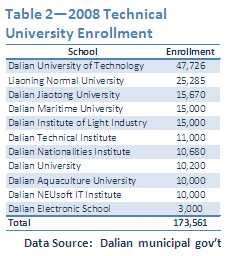 In fact, a 200,000 square meter contract has already been signed with the Ambow Education Group to provide a campus and facilities that will hold up to 10,000 students. The first phase of the institute will be completed in the beginning of 2010, with construction of the second half expected to conclude in 2013. In addition to these facilities, Dalian Tiandi has jointly established the IT Talent Foundation and Scholarship with the local Dalian government, which will be funded by donations of RMB10 million per year for five years as an incentive for talent creation.
In fact, a 200,000 square meter contract has already been signed with the Ambow Education Group to provide a campus and facilities that will hold up to 10,000 students. The first phase of the institute will be completed in the beginning of 2010, with construction of the second half expected to conclude in 2013. In addition to these facilities, Dalian Tiandi has jointly established the IT Talent Foundation and Scholarship with the local Dalian government, which will be funded by donations of RMB10 million per year for five years as an incentive for talent creation.
Consistent with the natural advantages of the area, Dalian Tiandi will focus primarily on attracting companies with a presence in the Japanese market and in the specific industries including desktop publishing, financial service outsourcing, embedded software development, and digital information centers. Although Dalian Tiandi is still in the early stages of development, it has already attracted considerable interest from MNCs and Fortune 500 companies. Some of these are entering into the final stages of negotiation to establish up to 200,000 square meters of office space in Huang Ni Chuan.
Aside from the facilities and services particular to each individual sub-park, the common benefits available to certain enterprises seeking to establish themselves in the DHTZ include a wide range of preferential policies and incentives pertaining to taxes, tariffs, and talent. According to the local government’s Foreign Investment Promotion Bureau of DHTZ, corporate income taxes for firms recognized as high-tech enterprises will be levied at a reduced rate of 15 percent, whereas those firms qualifying as software enterprises will receive an additional two years full exemption and three years half deduction upon establishing their company in the DHTZ. After the initial full exemption and half deduction years, certain qualified software companies will be entitled to receive an additional reduction to their income taxes, bringing the rate down to 10 percent. All software companies are eligible to deduct salary and training expenses from the amount of taxable income.
Integrated circuit companies are also eligible for preferential policies particular to their industry. For example, the period of depreciation for IC manufacturing equipment can be shortened to three years. Additionally, certain preferential policies for encouraging investment in communication technologies are applicable to IC enterprises satisfying at least one of the following requirements: the company has a project with total investment exceeding RMB8 billion or is developing an integrated circuit line to produce ICs smaller than 0.25 nanometers. Lastly, IC design industry companies are entitled to the same preferential policies as software companies.
With regards to VAT policies, companies selling software products developed in-house and which pay 17 percent VAT will be eligible for immediate reimbursement of the portion of actual taxation exceeding 3 percent VAT, to be spent on R&D and expansion. A similar VAT incentive is available to integrated circuit companies which develop in-house IC products, with the only difference being that the portion for reimbursement towards expansion and R&D is the amount exceeding 6 percent VAT. Additionally, except where prohibited by law, all equipment, spare parts, and accessories for self-use (including software) can be imported without payment of duty and VAT.
Preferential tariff policies for high-tech companies located in the DHTZ include the ability for especially large companies to establish a bonded warehouse or bonded plant inside the zone, allowing for exemption of import duties, import product taxes, and VAT on the actual exported quantity of the processed goods. Furthermore, exported products manufactured by high-tech companies are exempt from export duties, except for restricted products explicitly specified by the state. Lastly, instruments and equipment needed by high-tech companies in the DHTZ that are unavailable in China can be imported free of duties.
Just as high-tech firms based in the DHTZ receive policy-based incentives, individual employees of companies in the DHTZ also receive benefits intended to attract and retain skilled professionals while also providing opportunities and incentives for training new talent.
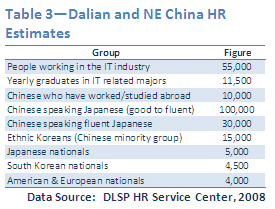 Chinese professionals with special skills are eligible to receive permanent residency permissions (Dalian hukou) from the relevant authorities, along with his or her spouse and children. Also, for software technicians, managers, overseas scholars and foreigners employed at software companies in the DHTZ whose annual salary exceeds RMB60,000 (indicating a significant level of experience and value), 40-100 percent of the income tax can be refunded to the individual. Furthermore, provided that a minimum one-year contract has been signed, senior and urgently-needed talent from other cities who are coming to work in Dalian for the first time can receive a settling-in allowance ranging from RMB5,000 to RMB30,000, depending on skills and experience.
Chinese professionals with special skills are eligible to receive permanent residency permissions (Dalian hukou) from the relevant authorities, along with his or her spouse and children. Also, for software technicians, managers, overseas scholars and foreigners employed at software companies in the DHTZ whose annual salary exceeds RMB60,000 (indicating a significant level of experience and value), 40-100 percent of the income tax can be refunded to the individual. Furthermore, provided that a minimum one-year contract has been signed, senior and urgently-needed talent from other cities who are coming to work in Dalian for the first time can receive a settling-in allowance ranging from RMB5,000 to RMB30,000, depending on skills and experience.
In an effort to ensure quality training for new professionals and recent graduates, the local government is providing assistance and annual subsidies of up to RMB100,000 to local colleges and universities engaged in pre-job training of IT and service outsourcing talent in order to construct a DHTZ Software Talent Supply and Training Base.
The favorable administrative and operational environment of the DHTZ has already succeeded in enticing a large number of multinational corporations to the area. Of the over 3000 companies registered in the DHTZ, nearly one-third of them are foreign funded with over 60 of them appearing on the Fortune Global 500 list, including Accenture, BearingPoint, BT, Cisco, Citigroup, Dell, Fidelity, HP, IBM, Intel, Microsoft, Nokia, NTT, Siemens, Sony, and Toyota. Although the primary industry of the DHTZ is IT/ITES, the semiconductor, biotech, and advanced equipment manufacturing industries have a considerable presence as well. Within the IT/ITES industry, operations range from software development, to consulting, system integration, BPO, IT services, engineering design, and technical support.
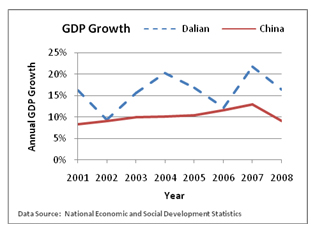 Even in light of China’s extraordinary economic growth, the city of Dalian stands out as an economic hot spot; with annual GDP growth exceeding the national level every year over the past decade. Within Dalian, the DHTZ has shown resilience to the devastating effects of the recent financial crisis, as foreign companies under pressure to cut costs seek out new avenues for outsourcing their services and back-office operations. Overall, the Dalian High-Tech Zone has already taken major steps and experienced great success in establishing itself as a key ITO/BPO services hub not only in China but also on the global level. Although the majority of foreign firms that have established themselves in the DHTZ are Japanese companies, the number of major Western firms operating in the zone is growing at an increasing rate. Adding to this the ambitious plans for further development and training improvements over the next decade and the DHTZ will undoubtedly receive an increasing amount of attention from Western companies looking for convenient, low-cost, high-skills outsourcing opportunities; especially for servicing Japanese, Korean, and other Asian markets.
Even in light of China’s extraordinary economic growth, the city of Dalian stands out as an economic hot spot; with annual GDP growth exceeding the national level every year over the past decade. Within Dalian, the DHTZ has shown resilience to the devastating effects of the recent financial crisis, as foreign companies under pressure to cut costs seek out new avenues for outsourcing their services and back-office operations. Overall, the Dalian High-Tech Zone has already taken major steps and experienced great success in establishing itself as a key ITO/BPO services hub not only in China but also on the global level. Although the majority of foreign firms that have established themselves in the DHTZ are Japanese companies, the number of major Western firms operating in the zone is growing at an increasing rate. Adding to this the ambitious plans for further development and training improvements over the next decade and the DHTZ will undoubtedly receive an increasing amount of attention from Western companies looking for convenient, low-cost, high-skills outsourcing opportunities; especially for servicing Japanese, Korean, and other Asian markets.
Gary Clubb is a junior consultant at Dezan Shira & Associates’ Dalian office. Dezan Shira & Associates is a foreign direct investment practice offering business advisory, tax, accounting, due diligence, payroll and audit services for multinational clients in China, Hong Kong, Vietnam and India. For professional advice and assistance in Dalian, please contact dalian@dezshira.com or visit www.dezshira.com.
Correction: September 21, 2009
The original version of this article incorrectly stated the number of employees at the Dalian Ascendas IT Park as 2,500. In addition, Shui On group was incorrectly identified as Shuion Group
- Previous Article New Procedures Issued for Customs Declarations
- Next Article Employee Allowances and Benefits Now Taxable









